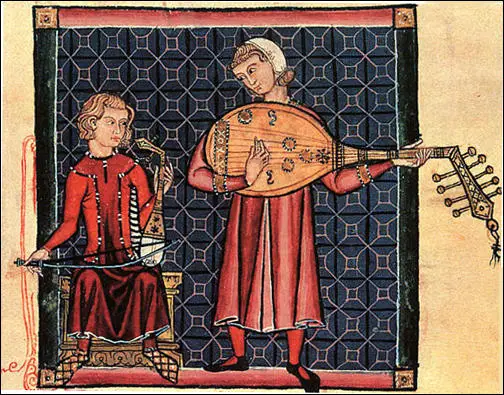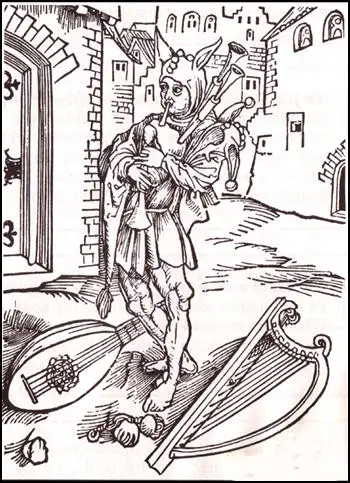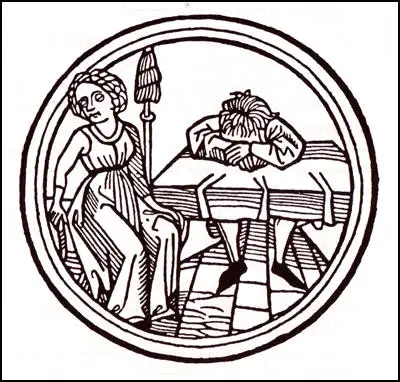William Langland
William Langland was probably born in Ledbury, Herefordshire in about 1332. Langland moved to London where he made his living by singing songs at rich men's funerals. It is also believed for many years he was a wandering minstrel visiting villages and towns. (1) John F. Harrison suggests that he was "a poor unbeneficed priest". (2)
Ballads sung by minstrels often dealt with the problems of the poor. The most popular character in these ballads was Robin Hood. Honest men who had been forced to become outlaws by cruel government officials or corrupt members of the clergy, were a common theme in these ballads. The peasants in the Middle Ages particularly seemed to like ballads that told of outlaws who stole from the rich to give to the poor. Langland wrote: "I can not perfectly say the Lord's Prayer as the priest sings it. But I know rhymes of Robin Hood". (3)

John Major wrote: "At this time (the reign of Richard the Lionheart) there flourished the most famous robbers Robin Hood and Little John, who lay in wait in the woods, and robbed those that were wealthy... The feats of Robin are told in song all over Britain. He would allow no woman to suffer injustice, nor would he rob the poor, but rather enriched them from the plunder taken from abbots." (4)
Some religious leaders, such as Thomas de Cobham, Bishop of Worcester, called for these wandering minstrels to be arrested: "There are actors who have musical instruments for men's delight. Some haunt public drinking houses and other assemblies, where they sing many songs to move men to mischievous behaviour... But there are others who sing about the lives of princes". (5)
Langland also wrote poetry and is believed to be the author of The Vision Piers the Plowman. Written in West Midland dialect, the poem tells the story of Piers, a simple countryman. Langland was himself very poor and the poem provides a first-hand account of what life was like for ordinary people living in England during the 14th century. The poem also attacked the corruption of the nobility and leading members of the church. (6)

George M. Trevelyan has argued that the poem is a religious allegory and used the blank verse derived from Anglo-Saxon poetry. "The spirit of Piers Plowman lived on in the religious earnestness of our fathers, their continual indignation at the wrongdoing of others and their occasional sorrow for their own." (7)
Trevelyan adds that this English form of poetry was later replaced by the rhyming approach of Geoffrey Chaucer. It has been pointed out that they took a very different view of society. "Both Langland and Chaucer saw things with the same eyes, but their vision was not the same kind. Nor did their ears hear the same things. As the one represents the mind of the wealthy, so does the other express the opinions of the poor." (8)

The first version of The Vision of Piers Plowman appeared in 1362. Langland constantly worked on the poem and further versions were circulated in 1377 and 1395. Over sixty copies of the book have survived, which suggests that Langland's poem must have been extremely popular in the Middle Ages. It was considered a dangerous book and was banned by the authorities. (9)
Langland's biographer, George Kane, has argued: "Langland's subject, a culture restive in the beginnings of radical change, is of huge moment.... The poem is charged with deep spiritual unease, loss of confidence in the order of things, a condition for which no durable and intelligent explanation was possible because the available forms of thinking were inadequate to this. It particularized itself in a sense of discrepancy, a consciousness of oppositions that should not exist, between material and spiritual values, between moral excellence as a philosophically conceived value and the visibly prevalent imperfection of actuality, between knowledge of right conduct and failure in the possessors of that knowledge to realize it... and, in the deepest theological sense, between the God of justice and the God of love. At the centre of this anxiety was the evident failure of the church's ministers in pastoral care." (10)
In his poem Langland shows concern for the poor: "Charged with children and overcharged by landlords, what they may spare they spend on milk or on meal to make porridge to still the sobbing of the children at meal time... The sadness of the women who live in these hovels is too sad to speak of or say in rhyme." He complains that the wealthy members of society showed little concern for the poor: "As weeds run wild on the dunghill, so riches spread upon riches give rise to all vices... The wealth of this world is evil to its keeper unless it be well spent." (11)
Langland was also critical of monks. "Langland's criticism of the monk's life was not, like much modern criticism including Wyclif's, due to want of appreciation of the retired, contemplative life of self-abnegation, but to Langland's perception that the monks had ceased to realize that ideal." (12)
Langland provides important information about everyday life including marriage: "Thus marriage was made - first by the consent of the father and the advice of friends, and then by the mutual agreement of the two partners. So marriage was established, and God himself made it." (13)
William Langland may also have been the author of Richard the Redeless, a poem attacking the rule of Richard I. Langland died in about 1400.
Primary Sources
(1) William Langland, The Vision of Piers Plowman (c. 1365)
I can not perfectly say the Lord's Prayer as the priest sings it. But I know rhymes of Robin Hood and Randolph, earl of Chester.
(2) William Langland, The Vision of Piers Plowman (c. 1365)
Charged with children and overcharged by landlords, what they may spare they spend on milk or on meal to make porridge to still the sobbing of the children at meal time... The sadness of the women who live in these hovels is too sad to speak of or say in rhyme.
(3) William Langland, The Vision of Piers Plowman (c. 1365)
As weeds run wild on the dunghill, so riches spread upon riches give rise to all vices... The wealth of this world is evil to its keeper unless it be well spent.
(4) Hyman Fagan, Nine Days That Shook England (1938) page 118
Both Langland and Chaucer saw things with the same eyes, but their vision was not the same kind. Nor did their ears hear the same things. As the one represents the mind of the wealthy, so does the other express the opinions of the poor.
Student Activities
Wandering Minstrels in the Middle Ages (Answer Commentary)
The Growth of Female Literacy in the Middle Ages (Answer Commentary)
Women and Medieval Work (Answer Commentary)
The Medieval Village Economy (Answer Commentary)
Women and Medieval Farming (Answer Commentary)
Contemporary Accounts of the Black Death (Answer Commentary)
Disease in the 14th Century (Answer Commentary)
King Harold II and Stamford Bridge (Answer Commentary)
The Battle of Hastings (Answer Commentary)
William the Conqueror (Answer Commentary)
The Feudal System (Answer Commentary)
The Domesday Survey (Answer Commentary)
Thomas Becket and Henry II (Answer Commentary)
Why was Thomas Becket Murdered? (Answer Commentary)
Illuminated Manuscripts in the Middle Ages (Answer Commentary)
